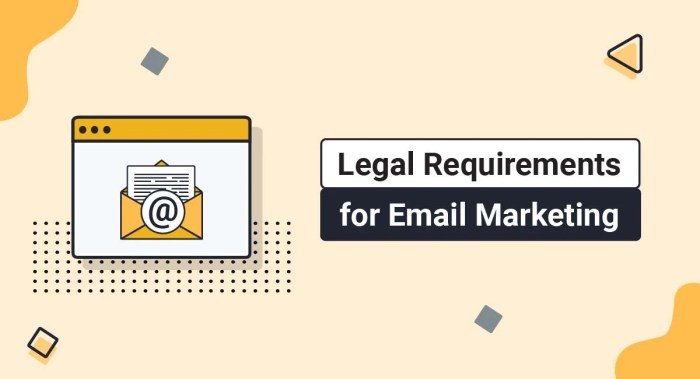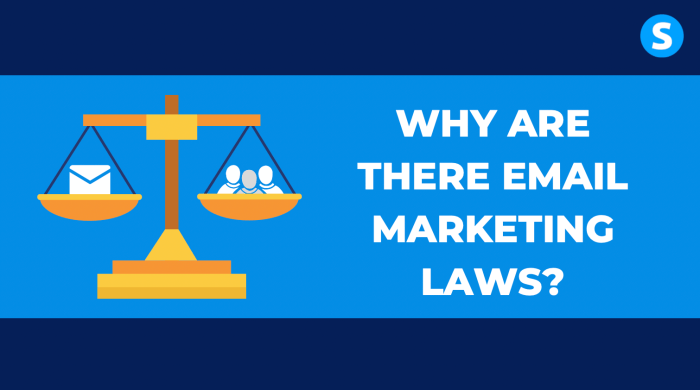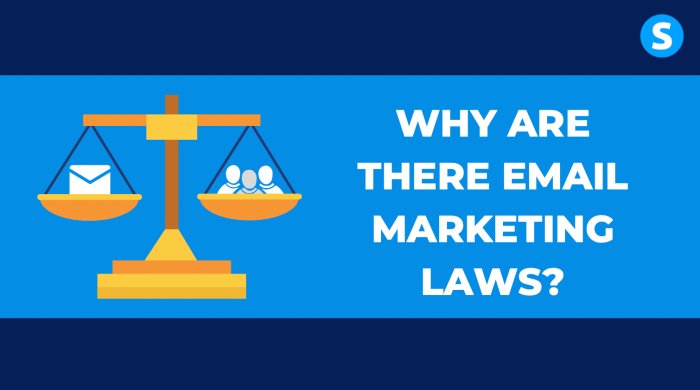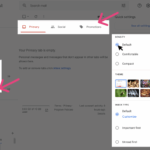Stay in line with the law when sending marketing emails is crucial for avoiding hefty fines and maintaining a positive brand image. This guide explores the legal landscape of email marketing, covering everything from understanding regulations like CAN-SPAM and GDPR to crafting compliant subject lines and managing subscriber data responsibly. We’ll also discuss handling complaints, staying updated on evolving laws, and protecting your business from potential legal challenges.
Navigating the complexities of email marketing compliance can feel daunting. This detailed breakdown provides actionable steps and real-world examples to ensure your campaigns are not only effective but also legally sound. We’ll delve into practical strategies to build trust with your subscribers and avoid pitfalls that could damage your reputation.
Understanding Legal Compliance in Marketing Emails: Stay In Line With The Law When Sending Marketing Emails

Staying within the bounds of the law when crafting marketing emails is crucial for building trust with recipients and avoiding costly penalties. This involves more than just polite language; it’s about understanding and adhering to specific regulations that govern commercial communication. Knowing the rules and best practices will protect your brand and ensure your marketing efforts are effective without legal repercussions.Legal compliance in marketing emails means adhering to the regulations and guidelines set by governing bodies to ensure ethical and transparent communication with recipients.
This includes respecting recipient preferences, providing accurate information, and avoiding deceptive practices. Non-compliance can lead to significant legal issues and financial repercussions.
Key Legal Frameworks
Understanding the legal frameworks that apply to marketing emails is essential for maintaining compliance. These frameworks provide the foundation for responsible email marketing practices and help prevent violations. CAN-SPAM, GDPR, and CCPA are among the most significant regulations.
- CAN-SPAM Act (Controlling the Assault of Non-Solicited Pornography and Marketing): This US law primarily regulates commercial emails, requiring sender identification, opt-out mechanisms, and accurate header information. It’s crucial for avoiding the sending of unsolicited bulk emails, especially those that are deceptive or misleading.
- General Data Protection Regulation (GDPR): This EU regulation focuses on protecting the personal data of individuals within the EU. For email marketing, GDPR mandates explicit consent from recipients before collecting or processing their personal data, transparency about data usage, and providing users with the right to access, correct, or delete their data.
- California Consumer Privacy Act (CCPA): This California law addresses consumer privacy rights. It’s critical for companies that market to California residents, requiring them to provide clear and concise information about data collection practices, allowing consumers to opt out of data sales, and offering a right to deletion of personal information.
Accuracy and Transparency
Maintaining accuracy and transparency in email content is paramount. Recipients must receive information that is truthful and avoids misleading statements. This is not only a matter of ethical conduct but also a legal requirement in many jurisdictions.
- Accurate Information: Avoid making false or misleading claims about products, services, or discounts. Ensure all information provided is verifiable and backed by evidence.
- Clear Opt-Out Mechanisms: Include a clear and prominent unsubscribe link or mechanism within each email, allowing recipients to easily opt out of future communications.
- Transparency about Data Usage: Be upfront about how you collect, use, and share recipient data. Provide a clear privacy policy that Artikels your data handling practices and adheres to relevant regulations.
Identifying Potentially Problematic Language
Carefully reviewing email subject lines and body text for potential issues is critical. Pay attention to language that could be perceived as misleading, deceptive, or offensive.
- Subject Lines: Avoid using misleading subject lines that don’t accurately reflect the email content. Examples include using urgency or scarcity tactics without legitimate reason, or using overly sensational language.
- Body Text: Scrutinize the body of the email for misleading or inaccurate statements. Verify any claims with factual evidence and avoid using aggressive or inappropriate language.
Penalties for Violations
Non-compliance with email marketing regulations can lead to significant penalties, including fines, legal action, and reputational damage. It’s important to prioritize legal compliance to avoid these consequences.
Examples of potential penalties include monetary fines, injunctions, and cease-and-desist orders. Furthermore, negative publicity resulting from violations can severely harm a company’s reputation and brand image.
Content and Subject Line Best Practices
Crafting compelling and compliant marketing emails requires careful attention to both the subject line and the body content. A well-structured email can significantly increase engagement, but misleading or deceptive elements can lead to legal issues and damage your brand reputation. This section delves into best practices for creating subject lines and email content that is truthful, accurate, and compliant with regulations.Understanding the importance of clear and honest communication in marketing emails is crucial for maintaining trust with your audience and avoiding legal repercussions.
By following best practices, you can ensure your emails are not only effective but also legally sound.
Subject Line Best Practices to Avoid Deception
Subject lines are the first impression your email makes. Crafting clear and accurate subject lines is vital to avoid misleading recipients. A compelling subject line encourages recipients to open your email, while deceptive subject lines can lead to recipients ignoring or marking them as spam.
- Avoid using exaggerated or unrealistic claims in your subject lines. Instead, use clear and concise language that accurately reflects the email content. For example, instead of “Get Rich Quick!”, use “Learn Proven Strategies for Financial Growth.”
- Be transparent about the content of your email. If it’s a promotional email, clearly state that in the subject line. For example, “Exclusive Offer: 20% Off Your First Order” is better than “Amazing Deal!.”
- Ensure the subject line accurately reflects the email’s content. Don’t use misleading subject lines to entice recipients to open the email. If the email is about a specific product or service, the subject line should reflect that. For example, instead of “Important Announcement!”, use “Update on Our New Product Launch.”
- Refrain from using urgent or scare tactics. Avoid phrases like “Limited Time Offer!” or “Act Now!” unless the offer truly is limited. These tactics can be perceived as misleading or manipulative.
Examples of Compliant and Non-Compliant Subject Lines
| Compliant Subject Line | Email Body Content | Non-Compliant Subject Line | Potential Legal Issues |
|---|---|---|---|
| Exclusive Offer: 20% Off Your First Order | Details about the 20% discount and how to claim it. Includes the terms and conditions. | Get Rich Quick! | False and deceptive claims regarding financial gain. |
| Free Shipping on Orders Over $50 | Clear explanation of the free shipping policy and applicable conditions. | Limited Time Offer! Only 24 Hours Left! | May mislead recipients if the offer isn’t genuinely limited. |
| New Product Launch: Introducing the SmartWatch Pro | Detailed description of the new SmartWatch Pro, features, and benefits. | Revolutionary SmartWatch – Transform Your Life! | Overly exaggerated claims that could be false or unsubstantiated. |
Ensuring Truthful and Accurate Email Content
Accurate and verifiable information is essential in marketing emails. Providing misleading or inaccurate information can lead to legal issues and damage your brand reputation.
- Verify all claims and information before including them in your emails. Fact-checking is crucial for maintaining accuracy.
- Clearly state any limitations or restrictions associated with promotions or offers. Providing complete details avoids misunderstandings and potential legal problems.
- Avoid making unsubstantiated or misleading claims about your products or services. Focus on factual descriptions and verifiable benefits.
- If you are advertising or promoting a product, provide accurate and complete information about its features and benefits. Ensure this information is truthful and avoids exaggeration.
Labeling Promotions and Sponsored Content
Clearly labeling promotions and sponsored content is vital for transparency.
- Use clear and conspicuous labels to identify sponsored content. Examples include “Sponsored Post,” “Ad,” or “Paid Advertisement.” This helps recipients distinguish between promotional content and genuine editorial content.
- If you are using testimonials or endorsements, clearly disclose any compensation or relationship between your brand and the endorser. Full transparency builds trust and avoids misrepresentation.
- Include a disclaimer when making claims or endorsements. This can help mitigate any potential legal issues.
Importance of Accurate Information
Accurate information builds trust and credibility. Providing verifiable data is crucial to maintaining a strong reputation.
Staying compliant when crafting marketing emails is crucial. Understanding your audience’s engagement, like Facebook likes, can be incredibly helpful. A great resource for a data-driven approach to interpreting Facebook likes is this article on Facebook likes data-driven answers. Ultimately, using this knowledge wisely helps you craft targeted campaigns that respect legal guidelines.
- Double-check all information, including product specifications, pricing, and availability, to ensure accuracy. This is essential to avoid errors and legal issues.
- Use verifiable sources for statistics and claims. This adds credibility to your emails and avoids potential accusations of false advertising.
Subscriber Management and Consent
Building a successful email marketing campaign hinges on respecting your subscribers’ wishes and maintaining their trust. This involves a comprehensive approach to managing subscribers and obtaining their explicit consent for your communications. Ignoring these crucial elements can lead to serious legal ramifications and damage your brand reputation.Understanding and adhering to regulations surrounding data privacy and consent is vital.
This section delves into the practical aspects of obtaining and maintaining consent, ensuring data security, and facilitating subscriber opt-outs.
Explicit Consent for Marketing Emails
Obtaining explicit consent is paramount. This means actively seeking permission from individuals to send them marketing emails, rather than relying on implied consent. Explicit consent demonstrates respect for subscriber preferences and safeguards against potential legal issues. Failing to obtain explicit consent can result in hefty fines and damage to your reputation.
Data Privacy and Security
Protecting subscriber data is critical. Implement robust security measures to safeguard personal information. This includes encrypting data transmission, employing strong passwords, and regularly updating security protocols. Complying with data protection regulations like GDPR or CCPA is essential. Regularly audit your data security practices to identify and mitigate potential vulnerabilities.
Subscriber Opt-Out Mechanisms
Providing a clear and easily accessible unsubscribe option is a legal and ethical requirement. Ensure your unsubscribe process is straightforward and allows subscribers to easily remove themselves from your email list. Include clear instructions in your emails about how to unsubscribe. A prominent unsubscribe link is a must.
Staying compliant with email marketing regulations is crucial. Knowing the legalities is key, but did you know the shocking truth about graphics can sometimes impact your email deliverability? Shocking truth about graphics reveals how certain images can trigger spam filters. This understanding is vital for ensuring your marketing emails reach the intended audience, not the junk folder.
Ultimately, understanding both legal and technical aspects of email marketing is essential for success.
Compliance-Friendly Opt-in Forms
The opt-in form is your first point of contact for gaining consent. Design forms that are clear, concise, and easy to understand. Clearly indicate the purpose of collecting data and what type of communications subscribers will receive. Provide specific options for the types of emails subscribers want to receive (e.g., product updates, promotions, newsletters).
- Clear and concise language: Use simple and straightforward language to explain the purpose of collecting data.
- Explicit opt-in: Use clear and unambiguous language to obtain explicit consent for marketing communications.
- Specific communication types: Allow subscribers to choose which types of marketing communications they want to receive (e.g., newsletters, promotional emails).
- Easy-to-find unsubscribe links: Include a prominent and easily accessible unsubscribe link in all marketing emails.
Regional Data Collection Requirements
Different regions have varying data collection requirements. Understanding these differences is essential for ensuring compliance. This table demonstrates the key distinctions:
| Region | Key Data Protection Regulations | Specific Requirements |
|---|---|---|
| European Union (GDPR) | General Data Protection Regulation | Explicit consent, right to access, rectification, erasure, restriction of processing, data portability, right to object |
| California (CCPA) | California Consumer Privacy Act | Right to know, right to delete, right to opt-out of sale of personal information |
| Other Jurisdictions (e.g., Brazil, Canada) | Local Data Protection Laws | Specific requirements based on the law in place in that jurisdiction |
Data Protection and Security
Protecting subscriber data is paramount in email marketing. Robust data protection measures not only build trust with recipients but also mitigate legal risks and safeguard your brand reputation. A proactive approach to security ensures compliance with regulations like GDPR and CCPA, fostering a positive subscriber experience.Data breaches can have devastating consequences, ranging from financial losses to irreparable damage to your brand image.
Implementing strong security measures is not just a best practice, it’s a necessity in today’s digital landscape. A secure email list acts as a cornerstone for a healthy marketing strategy, fostering trust and encouraging continued engagement.
Potential Data Privacy and Security Risks
Marketing email campaigns are vulnerable to various threats. Phishing attempts, malware infections, and data breaches are potential risks. Weak passwords, insufficient access controls, and inadequate encryption protocols can expose sensitive subscriber information. The potential for human error, such as employees accidentally sharing data, must also be considered.
Securing Email List Data
Several steps can be taken to secure your email list data and protect subscriber information. Implementing robust password policies, multi-factor authentication, and regular security audits are crucial. Use strong encryption for data transmission and storage. Regularly reviewing and updating security protocols is essential.
- Employ strong password policies, requiring a combination of uppercase and lowercase letters, numbers, and symbols.
- Implement multi-factor authentication (MFA) for all accounts accessing the email marketing system.
- Regularly conduct security audits to identify vulnerabilities and weaknesses.
- Encrypt data both in transit and at rest, using industry-standard encryption methods.
- Establish clear data access controls to limit access to sensitive information only to authorized personnel.
Handling Subscriber Data Breaches, Stay in line with the law when sending marketing emails
A data breach can significantly impact your business. A swift and transparent response is critical. Immediate notification to affected subscribers, regulatory authorities, and any other relevant parties is paramount. Investigating the cause of the breach and implementing corrective actions are essential to prevent future incidents. In the aftermath, building trust and regaining subscriber confidence is crucial.
- Establish a clear data breach response plan.
- Immediately notify affected subscribers, regulatory bodies, and other relevant parties.
- Conduct a thorough investigation to determine the cause of the breach.
- Implement corrective actions to prevent future incidents, such as upgrading security protocols and strengthening access controls.
- Proactively communicate with affected parties about the steps taken to resolve the issue and prevent future occurrences.
Data Encryption and Access Controls
Implementing data encryption and access controls for email marketing systems is vital for protecting subscriber data. Strong encryption methods, like Advanced Encryption Standard (AES), should be used for both data in transit and at rest. Implement granular access controls, limiting access to only authorized personnel. Regularly review and update access controls to ensure they remain effective.
- Utilize robust encryption protocols, like AES-256, to secure data both in transit and at rest.
- Implement granular access controls, ensuring only authorized personnel have access to sensitive subscriber data.
- Regularly review and update access controls to maintain effectiveness and align with evolving security best practices.
- Employ a least-privilege principle, granting only necessary access levels to personnel.
Data Protection Regulations Comparison
Various data protection regulations exist globally, impacting how companies handle personal data. A comprehensive understanding of these regulations is essential for compliance. Comparing different regulations highlights the variations in requirements.
| Regulation | Key Focus | Key Requirements |
|---|---|---|
| GDPR (General Data Protection Regulation) | EU citizen data protection | Consent, data minimization, purpose limitation, data security, and accountability |
| CCPA (California Consumer Privacy Act) | California resident data protection | Consumer rights regarding their personal information, including access, deletion, and portability |
| CCPA (California Consumer Privacy Act) | California resident data protection | Consumer rights regarding their personal information, including access, deletion, and portability |
| Other Regional Regulations | Country-specific data protection | Varied requirements based on specific laws |
Handling Complaints and Disputes
Navigating subscriber complaints and disputes is crucial for maintaining a positive brand image and upholding legal compliance in email marketing. Effective complaint handling demonstrates respect for subscribers and proactively addresses concerns, preventing escalation and potential legal issues. A well-defined procedure for handling these situations is essential for building trust and preserving long-term subscriber relationships.
Subscriber Complaint Resolution Procedures
A structured approach to resolving subscriber complaints is vital. This involves prompt acknowledgment, thorough investigation, and a clear path for resolution. Subscribers should be given a dedicated channel for submitting complaints, such as a dedicated email address or a web form. This ensures a clear and efficient process for both the sender and the recipient. Providing options for communication—email, phone, or live chat—will allow for flexibility and accessibility.
Dispute Resolution Strategies
Effective dispute resolution requires empathy and a willingness to find a solution that satisfies both parties. Strategies for resolving disputes should focus on understanding the subscriber’s perspective and addressing their concerns. Active listening and clear communication are key. Offering various resolution options, such as refunds, account cancellations, or explanations, will demonstrate a proactive approach to resolving conflicts.
A well-defined escalation process, with clear guidelines for when and how to escalate a complaint, is also important.
Importance of Maintaining Records
Maintaining detailed records of all subscriber interactions is crucial for transparency and accountability. This includes every communication, complaint, and resolution attempt. Comprehensive records serve as evidence in case of legal challenges and help to identify patterns or trends in subscriber complaints. These records should be securely stored and easily accessible for internal review. The information should be organized in a way that facilitates quick retrieval and analysis.
Staying compliant with email marketing regulations is crucial. Think about how much attention goes to the top of an email, but the reality is that the “above the fold” area isn’t as important as you might think. Modern email design needs to consider the entire message, and understanding that the fold is a myth, like why the fold is a myth , allows you to craft more effective campaigns that prioritize clear messaging and important calls to action.
This focus on the entire email helps you avoid accidentally violating those legal guidelines.
Legal Challenges
In the event of a legal challenge related to email marketing practices, having a documented and transparent record of subscriber interactions is critical. This record should include all communications, complaint resolutions, and any internal discussions regarding the matter. Consult with legal counsel to understand the specific requirements of the jurisdiction in which the email marketing activities are taking place.
A detailed understanding of the specific legal regulations and how they relate to email marketing is crucial.
Common Subscriber Complaints and Recommended Responses
| Common Subscriber Complaint | Recommended Response |
|---|---|
| Unsolicited or unwanted emails | Acknowledge the complaint, apologize for the inconvenience, and provide clear unsubscribe instructions. Offer an option to opt-out of future emails. |
| Inaccurate or misleading information | Acknowledge the complaint, investigate the issue, and provide a corrected version of the information. Offer an apology and a clear explanation of the mistake. |
| Violation of privacy | Acknowledge the complaint, investigate the issue, and assure the subscriber that their privacy is a top priority. Offer a detailed explanation of the data collection and usage policies. If applicable, offer to delete the subscriber’s data. |
| Technical issues with email delivery | Acknowledge the complaint, investigate the issue, and take steps to resolve the delivery problems. Provide updates on the progress of the resolution. |
Staying Updated on Legal Changes
Staying compliant with email marketing regulations is an ongoing process, not a one-time task. The landscape of digital marketing law is constantly evolving, with new regulations emerging and existing ones being refined. Keeping abreast of these changes is crucial to avoid penalties and maintain a positive brand reputation.The email marketing industry is constantly evolving, requiring marketers to stay vigilant about regulatory updates.
This vigilance is essential for maintaining a positive brand image and avoiding legal issues. Understanding the nuances of legal changes and promptly adapting strategies is critical for sustained success in this ever-shifting environment.
Resources for Staying Informed
Regularly checking reputable sources is essential for staying current with legal updates. These resources can provide insights into potential changes and their impact on email marketing practices. Reliable news outlets, legal journals, and industry publications offer up-to-date information. Staying connected to relevant online forums and communities can also provide valuable insights.
Monitoring Updates and Adapting Strategies
Monitoring for updates is not a passive task. Actively searching for news related to email marketing regulations, especially in your region or sector, is critical. This proactive approach ensures that you are aware of any pending changes or interpretations. Once updates are identified, assess their impact on your current email marketing strategies and promptly implement any necessary adjustments.
Importance of Regular Reviews of Email Marketing Practices
Regular reviews of email marketing practices are not just a good idea; they are essential for ongoing compliance. This involves a thorough examination of all aspects, from subject lines and content to subscriber management and data handling. Regular reviews should be scheduled to ensure that all elements comply with current regulations.
Consulting with Legal Professionals for Complex Situations
For complex situations, consulting with legal professionals is highly recommended. They can provide tailored advice specific to your circumstances, helping you navigate intricate legal matters. This step can be particularly important when dealing with new or rapidly evolving regulations. Legal professionals can assess your current strategies and advise on necessary changes to ensure full compliance. This expert guidance is invaluable for maintaining a strong legal footing in email marketing.
Examples of Recent Changes Impacting Email Marketing
Recent changes in regulations impacting email marketing often relate to data privacy and consent. For example, updates to the General Data Protection Regulation (GDPR) in the European Union or the California Consumer Privacy Act (CCPA) in California, and other similar state and national laws, have significantly altered how businesses handle user data. These updates require businesses to be more transparent and diligent in managing user consent, data collection, and data security.
These examples underscore the importance of staying informed about such changes.
Ending Remarks

In conclusion, staying in line with the law when sending marketing emails is not just about avoiding penalties; it’s about building a strong, trustworthy relationship with your audience. By understanding the legal frameworks, adopting best practices, and prioritizing data security, you can create successful email campaigns that respect your subscribers and protect your brand. Remember to always consult with legal professionals for specific advice tailored to your unique situation.






